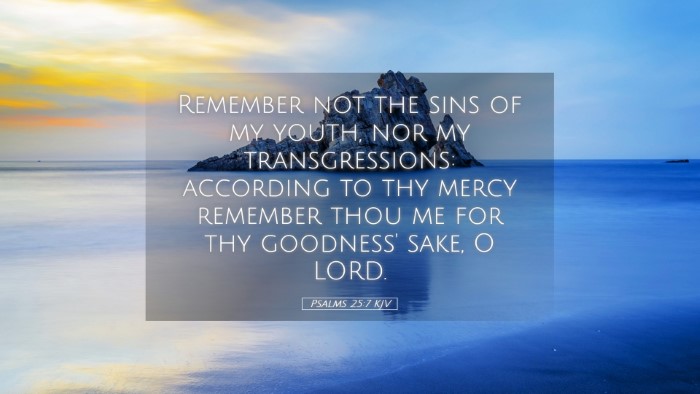Psalms 25:7 Commentary
Verse Reference: Psalms 25:7 - "Remember not the sins of my youth, nor my transgressions: according to thy mercy remember thou me for thy goodness' sake, O Lord."
Overview
This verse from Psalm 25 is a poignant plea for mercy and forgiveness. It is a humble acknowledgment of past sins, particularly those committed in youth, and it reflects a deep understanding of God's covenant faithfulness and goodness. The psalmist implores God to overlook his transgressions, placing his hope not in his own righteousness but in God’s abundant mercy. This theme resonates with both personal introspection and broader theological implications regarding sin and divine grace.
Insights from Matthew Henry
Matthew Henry emphasizes the necessity of divine mercy in light of human sinfulness. He notes that the psalmist's prayer is rooted in a deep recognition of his past mistakes and an appeal to God's compassion. Henry articulates that our youthful indiscretions can haunt us, but it is essential to seek forgiveness rather than dwell in despair. He encourages believers to approach God with humility and a contrite heart, trusting in His readiness to pardon.
- Emphasis on Youthful Sins: Henry points out that sins committed in youth often form a significant part of our regrets. He reflects on how these sins can follow a person into adulthood if left unconfessed.
- The Nature of God's Mercy: He highlights that God's mercy is abundant and based on His goodness rather than our merit. The psalmist’s appeal is grounded in God’s character as loving and forgiving.
- Spiritual Reflection: Henry encourages believers to remember their past with the goal of growth and maturity, urging them to pursue holiness while relying on God’s grace.
Insights from Albert Barnes
Albert Barnes offers a detailed exegesis of the text, illuminating the structure and implications of the psalmist’s request. He suggests that the plea, "Remember not," is not merely a wish but a heartfelt expression of need for God's forgiveness.
- The Concept of 'Remembering': Barnes discusses how God's "remembering" is an act of divine consideration. To 'forget' implies that God chooses not to hold our sins against us, an act of grace that should inspire worship.
- Transgressions vs. Sins: He distinguishes between 'sins' of youth and 'transgressions,' indicating different levels of willfulness and maturity in sinful actions. Barnes portrays youth as a time prone to folly and error.
- Hope in God’s Goodness: The focus on God's goodness, rather than the psalmist's worthiness, serves as a theological anchor. It is a reminder to believers that our hope lies not in our actions but in His nature.
Insights from Adam Clarke
Adam Clarke's analysis provides a more devotional approach, offering both historical context and theological reflections. Clarke articulates the emotional weight of the verse and connects it to the believer's journey of repentance.
- The Emotional Plea: Clarke interprets the cry of the psalmist as one filled with desperation and earnestness. He emphasizes the importance of genuine repentance and a sincere heart in approaching God.
- Contextual Understanding: He notes that the psalmist likely reflected on his entire life, not just his youth. The plea suggests a broader contemplative process, recognizing that all sin impacts our relationship with God.
- Linking to Christ: Clarke points out that this longing for mercy ultimately finds its fulfillment in Christ, the perfect sacrifice whose blood covers all sins. Such theological reflection encourages believers to perceive the continuity of God’s redemptive plan.
Theological Implications
The plea articulated in Psalms 25:7 resonates deeply within theological discourse, highlighting core themes regarding sin, mercy, and divine goodness.
- Sin and its Consequences: The acknowledgment of youthful sin serves as a reminder of humanity's propensity to err. The psalmist’s recognition of his transgressions models a healthy approach to confronting personal sin.
- The Nature of God: The verse prompts a deeper consideration of God's character — merciful and good. This revelation offers believers assurance of God's willingness to forgive, reaffirming the relationship between repentance and divine favor.
- Hope and Assurance: As God remembers our sins no more, believers find hope in their future. This concept of divine forgetfulness encourages individuals to move forward in faith rather than remain tethered to past failures.
Practical Applications
Psalms 25:7 provides several applications for the life of believers, pastors, and theologians.
- Encouragement in Confession: This verse can embolden us in our confessions, reminding us that God's mercy is greater than our sin.
- Mentorship and Discipleship: Pastors and leaders might use this text to guide younger believers, encouraging them to seek forgiveness and cautioning against the pitfalls of youthful folly.
- Personal Reflection: For theologians and scholars, the text offers a call for personal reflection on the nature of sin, reminding us to stay humble and thankful before God.
Conclusion
Psalms 25:7 encapsulates a universal human experience — the struggle with guilt from the past and the search for forgiveness. Drawing from the works of noted commentaries, we find a rich tapestry of insights that speak to the heart of our faith: God's mercy triumphs over judgment, and His goodness is a reliable promise in the journey of life. As pastors, students, theologians, and scholars engage with this text, may they grasp more fully the depth of God's compassion and the call to live righteously in response to His grace.


